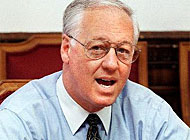
Swiss banks urged to disclose more Holocaust-era accounts

The financial authorities in New York have called on the big Swiss banks to open to public scrutiny 4.1 million accounts dating from the Second World War.
New York’s top banking regulator has said that Swiss banks should allow the entire database of accounts to be searched to see if the owners or heirs can be located.
The New York superintendent of banks, Elizabeth McCaul, made the demand during a district court hearing on Friday.
In his testimony, the New York City financial controller, Alan Hevesi, criticised Swiss banks for resisting calls to give the claim processors, and the public, greater access to their database of World War II-era accounts.
“We must move swiftly to distribute the funds,” he said, “the victims have already waited far too long”.
Swiss banks have so far re-examined 46,000 accounts in the search for unclaimed assets.
Following investigations of dormant accounts, and pressure from the United States and Jewish groups, the banks reached a $1.25 billion (SFr2 billion) settlement with Holocaust survivors, which was approved last summer.
During the hearing on Friday, the lawyer representing two top Swiss banks, Roger Witten, denied accusations that the banks have hampered the settlement by limiting access to the database.
The Swiss Bankers Association reacted with surprise to the demand for an examination of 4.1 million Nazi-era accounts. The Swiss accounts have already been studied by the Volcker commission, which was set up to investigate the Holocaust assets issue.
“The auditors of the Volcker commission examined the whole lot of them very carefully,” Bankers Association spokesman James Nason told swissinfo.
Nason said that apart from being unnecessary, unlimited access to all the accounts would breach Swiss banking secrecy laws. “I can’t see that the Swiss banks or the federal banking commission would authorise the creation of a database of 4.1 million accounts that everybody could access from their personal computers,” he said.
The banking commission, a Swiss government watchdog organisation, had to waive banking secrecy laws for the Volcker investigation to go ahead. Last year it authorised the publication of a list of 26,000 accounts with a likely Holocaust connection.
That list is to be published by the Bankers Association at the end of this month, with a further 20,000 names of account holders available on request.
In August last year the Volcker commission and the Swiss banks agreed to grant access to the archive of accounts to claimants who could not find their names among the 46,000 accounts but who had “reasoned and satisfactory” grounds to believe that they or their relatives had opened accounts before or during the war.
That provision was added to cover accounts that might have been opened by Swiss trustees in their own name, but on behalf of Jews who later died in the Holocaust.
In the event that the banks refuse to comply with the new request, New York’s financial controller, Alan Hevesi, is expected to call for the withdrawal of their licences to operate in the US.
swissinfo

In compliance with the JTI standards
More: SWI swissinfo.ch certified by the Journalism Trust Initiative




























You can find an overview of ongoing debates with our journalists here . Please join us!
If you want to start a conversation about a topic raised in this article or want to report factual errors, email us at english@swissinfo.ch.